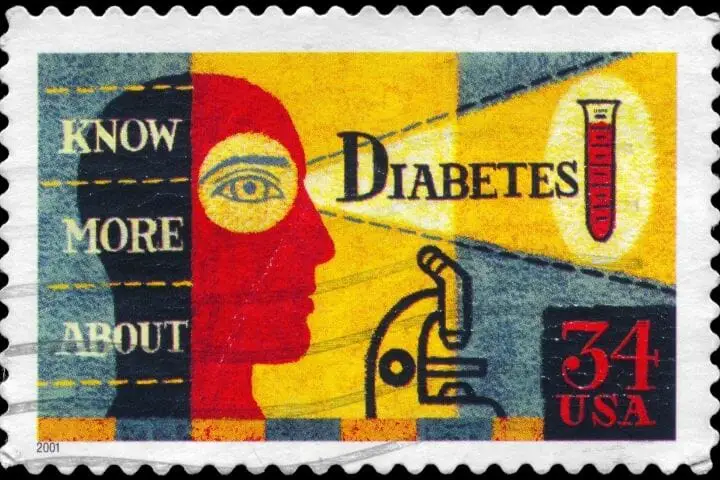Diabetes and Alzheimer’s are the most debilitating diseases for our bodies as we grow older. New research has found a link between diabetes and Alzheimer’s. As a caregiver, we need to understand that each disease enhances the risk of the other.
Contents
Diabetes, which affects the body’s ability to turn sugar into energy, affects almost 21 million people in the United States and more than 6 million of them are completely ignorant that they have been touched by Diabetes.
If diabetes is not adequately controlled, excessive sugar stays in the bloodstream. Body parts, along with the brain, can be damaged over time.

A growing body of research suggests a relationship between Type 2 diabetes, the 7th leading cause of death in America, and Alzheimer’s disease, the most prevalent type of dementia. Several long-term studies of large groups of persons with Type 2 diabetes show that they are more likely to acquire Alzheimer’s disease later in life.
Alzheimer’s disease is degenerative and a deadly brain ailment that eventually affects a person’s memory and ability to think critically reason, make decisions, communicate, and carry out everyday tasks.
Patients with Alzheimer’s disease may experience shifts in their personalities and behaviors as the disease develops. These changes may include worry, suspicion, restlessness, and hallucinations.
Making the Connection
According to research, persons with diabetes have a 65 percent higher chance of acquiring Alzheimer’s disease than individuals without diabetes. Because of this, researchers have started examining the connections between the two illnesses.
Impairment to the blood vessels is only one of the numerous consequences diabetes may lead to. Vascular cognitive impairment, which is a form of dementia induced by damage to the brain triggered by the diminished or obstructed blood supply to the brain, is associated with diabetes.
On the other hand, according to studies, both Alzheimer’s disease and Vascular cognitive impairment are major risk factors for people with diabetes. Scientists believe that each ailment feeds off the harm done by the other.

Type 2 diabetes impairs the brain’s capacity to use sugar (also known as glucose) and react to insulin in various ways, which may explain the connection.
Furthermore, diabetes may increase the chance of developing mild cognitive impairment, which is characterized by memory and cognitive difficulties that are more severe than those generally found in the normal aging process. Mild cognitive impairment is thought to precede or accompany Alzheimer’s disease.
There are several possible causes for the relationship, including:
Insulin Resistance
This can harm the brain’s mechanics if cells cannot use insulin properly. Brain cells that aren’t adequately nourished can’t do their jobs, which causes blood sugar levels to rise. As a result, fatty deposits might build up in the blood arteries.
Producing too much insulin can alter the chemical equilibrium in the brain, resulting in behavioral problems. Because of the profound effect on the brain, experts now refer to Alzheimer’s disease linked to insulin resistance as type 3 diabetes.
Inflammation and artery Damage:
Diabetics are more likely to suffer a heart attack or a stroke due to inflammatory and artery damage. Inflammation caused by elevated blood sugar levels might strain the arteries.
Alzheimer’s disease might develop as a result of damage to the arteries. Inflammation may also cause cells to become insulin-resistant, especially in obese individuals.
Obstructed Nerve Communication
Beta-amyloid, a protein that clumps together and gets trapped between nerve cells in the brain, is linked to increased blood sugar levels. This leads to messages being blocked in the brain, and a critical feature linked with Alzheimer’s disease is the failure of nerve cells to communicate effectively.

Tangled Tau Protein
Similar to train tracks, your cells constantly transport food and other materials through pathways. Tau, a protein, aids in the alignment of these tracks. The tau protein tangles up in the brains of people living with Alzheimer’s, resulting in shattered pathways and dead cells.
According to some research, people with diabetes have higher levels of tau tangles in their brains, leading to the death of more brain cells, a condition known as dementia.
High blood sugar often is an early warning sign
Diabetes, or high blood sugar levels, affects an estimated 54 million people in the United States. They will almost certainly develop Type 2 diabetes in the next 10 years.
Insulin resistance can be a symptom of high blood sugar. Uncontrolled insulin resistance is a hallmark of this condition, which affects the body’s ability to use blood sugar to power important functions.
To begin with, the body produces more insulin to meet its energy requirements. The body eventually produces all of the insulin it needs. Insulin resistance causes blood sugar levels to increase, and diabetes develops due to this.
Insulin and Blood sugar are harmful when they build up in the body. Since the tests are time-consuming and costly, doctors seldom check insulin levels. The following symptoms might also indicate insulin resistance:
- A disproportionately large belly (at least 40 inches in men and 35 inches in women)
- Above 130/85 systolic blood pressure
- HDL, or “good” cholesterol, levels are too low.

Treatment of Diabetes & Alzheimer’s
Your doctor may recommend a diabetic treatment plan if you have been diagnosed with type 2 diabetes and Alzheimer’s disease.
Type 2 diabetes is commonly treated with the following medications:
- Lifestyle adjustments like Changes in food, exercise, and weight reduction.
- Metformin and other biguanides like it are among the many drugs that have been used to treat type 2 diabetes.
- Only when lifestyle adjustments and other first-line medications fail to work are supplemented insulins employed
- Monitoring blood sugar levels and Hb A1C levels regularly
Preventing Alzheimer’s disease development may be possible with diabetic drugs, including metformin and glucagon-like peptides.
Drugs that promote insulin sensitivity in animals and humans may protect against Alzheimer’s disease-related neurological problems, enhance the brain’s capacity for glucose metabolism, and increase cognitive performance in some situations.
How to Direct Alzheimer’s and Diabetes Together as a Caretaker
A study published in the BioMed Central Medicine journal indicated that involving the individual in activities that foster independence and decision-making helps them better control their diabetes while they still can do so.
For diabetics, it may be feasible to include their prescription into an existing drug system that has clearly labeled instructions or containers.
The study also revealed that less than half of the households caring for an elderly diabetic got instructional information. Keeping yourself and your family members well-informed on diabetes is crucial for managing the illness, so ask your primary care physician, a diabetes specialist, or a diabetes educator for assistance. Attending a diabetic class at a local healthcare center may be an excellent idea.

Glucose Monitoring in Alzheimer’s
With Alzheimer’s, it’s difficult to maintain a regular glucose monitoring routine. Your loved one may be able to utilize alarms and alerts to aid them in remembering to check their blood sugar levels in the beginning stages. They may lose the capacity to do a fingerstick or recall what to do and why as the illness develops.
If you or a loved one have diabetes, it’s critical to choose a system that checks glucose with minimum effort from you or them.
The use of CGM, or continuous glucose monitoring, may be beneficial in the treatment of diabetes and the control of blood glucose levels.
All day and night, CGMs monitor blood glucose levels automatically. Your glucose level may be viewed at any moment, and you can watch how it varies over time to see if there are any patterns or trends. Thanks to this real-time knowledge, you’ll be able to make better judgments throughout the day.
Diabetic Diets and Nutrition
Both diabetes and heart disease can be managed well if a healthy food plan and regular exercise are followed. As memory and cognition deteriorate, mealtimes necessitate adjustments.
Managing diabetes in your family might be difficult if your loved ones don’t know what common foods to consume or if they eat too much of the same thing too frequently or in excess.
Healthy eating regimens are identical for both disorders, and mealtimes may be easier with a little planning. Consult their doctor first, and afterward follow these guidelines:
- A diet rich in fruits, vegetables, lean meat, low-fat dairy, and whole grains should be encouraged.
- The assortment of healthful foods and snacks should be readily available.
- Reduce your intake of foods high in saturated fats, cholesterol, and sugar.
- Snacks and meals provided for them should be clearly labeled.
- Consider the tastes of the person you’re cooking for.
- If at all feasible, assist your loved one in the preparation of their meals
- Provide easy access to Provide easy access to water.
- Regularly work out. Physical and mental health can be improved by even a few minutes walking about the neighborhood.
Recognizing how your beloved one eats can be made easier with regular glucose monitoring. Sugar levels might provide insight into whether or not someone in your family is skipping meals or overindulging at specific times of the day if you check on them frequently.
A reduction in glucose levels may indicate they haven’t eaten that day, while a dramatic rise might indicate they have consumed more than normal. Keeping a close eye on your loved one’s glucose levels helps you realize when it’s time to get more involved in their eating habits.

Prevention
Diabetes and Alzheimer’s disease prevention methods share many similarities, such as eating a balanced diet and getting more exercise. Follow these basic pillars to lower your chance of having Alzheimer’s disease:
- Take high-quality supplements and eat a diet that is high in natural foods and low in processed, refined metals, as recommended. The Mediterranean diet is a fantastic choice for this reason.
- Combining physical and mental exercise is the most effective strategy to maintain good health. Make an effort to do at least 150 minutes of aerobic and physical training every week.
- Deal with your feelings of unease. Meditation and yoga may be really beneficial.
- The benefits of social interaction and community service may be enormous in terms of improving your psychological well-being.
Numerous studies have shown that persons with type 2 diabetes can improve their glucose control by making lifestyle adjustments. Also helpful in preventing diabetes are actions like the four pillars outlined above.
- Losing 5-10% of your body weight can aid in the restoration of insulin sensitivity.
- Reduce the strain on your organs by quitting smoking.
- Reducing the impact of stress and improving glucose absorption by getting enough sleep
Fast food and a diet low in fiber are among the habits adopted by immigrants as they adapt and assimilate into American society.
If they want to keep their health in check, they should see a doctor or other health care expert on an ongoing basis. Diagnosis of diabetes and Alzheimer’s may be delayed. As a consequence, they restrict patients from obtaining treatment at the earliest available time.
A doctor-patient connection may aid in the early detection of diabetes and other health concerns. Taking regular measurements of your weight, blood pressure, cholesterol, and blood sugar levels is a good idea. Preventing complications like Alzheimer’s disease even if you’ve been diagnosed with diabetes is a good idea.

Wrap Up
If you’re worried about getting Alzheimer’s disease because you have diabetes, talk to your doctor about it. Their expertise may assist you in fine-tuning your management and treatment plans to strengthen your resistance to Alzheimer’s disease.
Some basic treatments such as lifestyle changes, losing weight, exercising more and giving up smoking and drinking are helpful in any case and you should immediately take them up. They will stand you in good stead for your future.
Please let us know if there’s anything you think we’ve missed or if you have any suggestions for how we can improve this guide.
Please share it with others and mention us on your social networking sites if you liked the article. Your shares can help increase awareness about the link between diabetes and Alzheimer’s and how you can avoid them to the maximum extent possible.
